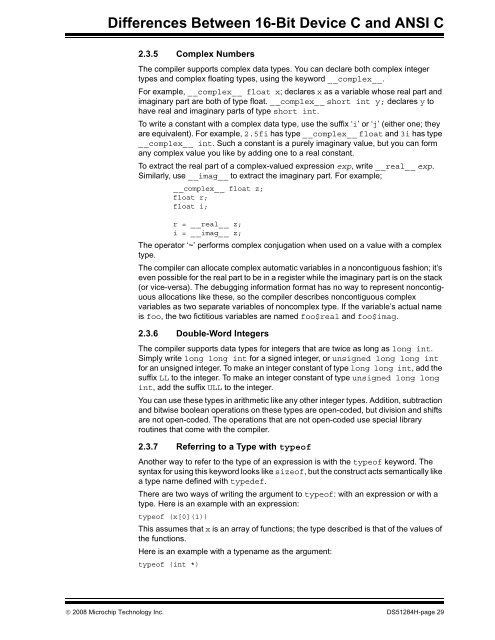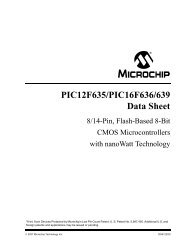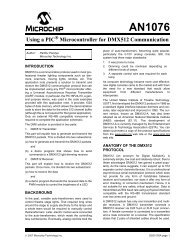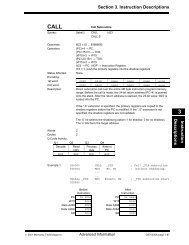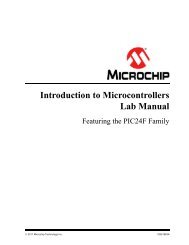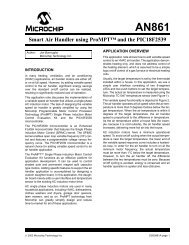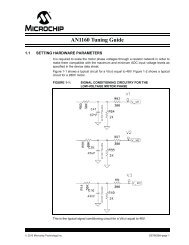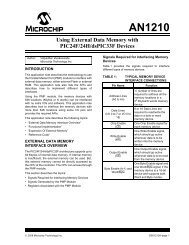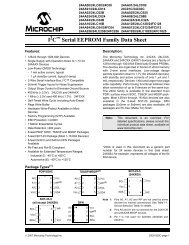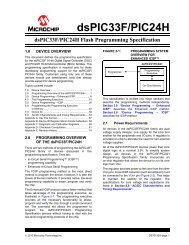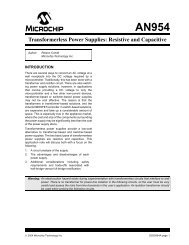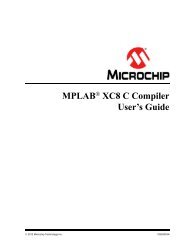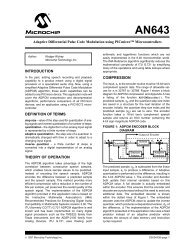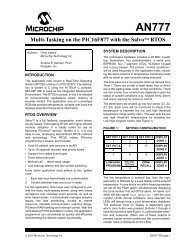MPLAB C Compiler for PIC24 MCUs and dsPIC DSCs ... - Microchip
MPLAB C Compiler for PIC24 MCUs and dsPIC DSCs ... - Microchip
MPLAB C Compiler for PIC24 MCUs and dsPIC DSCs ... - Microchip
You also want an ePaper? Increase the reach of your titles
YUMPU automatically turns print PDFs into web optimized ePapers that Google loves.
Differences Between 16-Bit Device C <strong>and</strong> ANSI C<br />
2.3.5 Complex Numbers<br />
The compiler supports complex data types. You can declare both complex integer<br />
types <strong>and</strong> complex floating types, using the keyword __complex__.<br />
For example, __complex__ float x; declares x as a variable whose real part <strong>and</strong><br />
imaginary part are both of type float. __complex__ short int y; declares y to<br />
have real <strong>and</strong> imaginary parts of type short int.<br />
To write a constant with a complex data type, use the suffix ‘i’ or ‘j’ (either one; they<br />
are equivalent). For example, 2.5fi has type __complex__ float <strong>and</strong> 3i has type<br />
__complex__ int. Such a constant is a purely imaginary value, but you can <strong>for</strong>m<br />
any complex value you like by adding one to a real constant.<br />
To extract the real part of a complex-valued expression exp, write __real__ exp.<br />
Similarly, use __imag__ to extract the imaginary part. For example;<br />
__complex__ float z;<br />
float r;<br />
float i;<br />
r = __real__ z;<br />
i = __imag__ z;<br />
The operator ‘~’ per<strong>for</strong>ms complex conjugation when used on a value with a complex<br />
type.<br />
The compiler can allocate complex automatic variables in a noncontiguous fashion; it’s<br />
even possible <strong>for</strong> the real part to be in a register while the imaginary part is on the stack<br />
(or vice-versa). The debugging in<strong>for</strong>mation <strong>for</strong>mat has no way to represent noncontiguous<br />
allocations like these, so the compiler describes noncontiguous complex<br />
variables as two separate variables of noncomplex type. If the variable’s actual name<br />
is foo, the two fictitious variables are named foo$real <strong>and</strong> foo$imag.<br />
2.3.6 Double-Word Integers<br />
The compiler supports data types <strong>for</strong> integers that are twice as long as long int.<br />
Simply write long long int <strong>for</strong> a signed integer, or unsigned long long int<br />
<strong>for</strong> an unsigned integer. To make an integer constant of type long long int, add the<br />
suffix LL to the integer. To make an integer constant of type unsigned long long<br />
int, add the suffix ULL to the integer.<br />
You can use these types in arithmetic like any other integer types. Addition, subtraction<br />
<strong>and</strong> bitwise boolean operations on these types are open-coded, but division <strong>and</strong> shifts<br />
are not open-coded. The operations that are not open-coded use special library<br />
routines that come with the compiler.<br />
2.3.7 Referring to a Type with typeof<br />
Another way to refer to the type of an expression is with the typeof keyword. The<br />
syntax <strong>for</strong> using this keyword looks like sizeof, but the construct acts semantically like<br />
a type name defined with typedef.<br />
There are two ways of writing the argument to typeof: with an expression or with a<br />
type. Here is an example with an expression:<br />
typeof (x[0](1))<br />
This assumes that x is an array of functions; the type described is that of the values of<br />
the functions.<br />
Here is an example with a typename as the argument:<br />
typeof (int *)<br />
© 2008 <strong>Microchip</strong> Technology Inc. DS51284H-page 29


